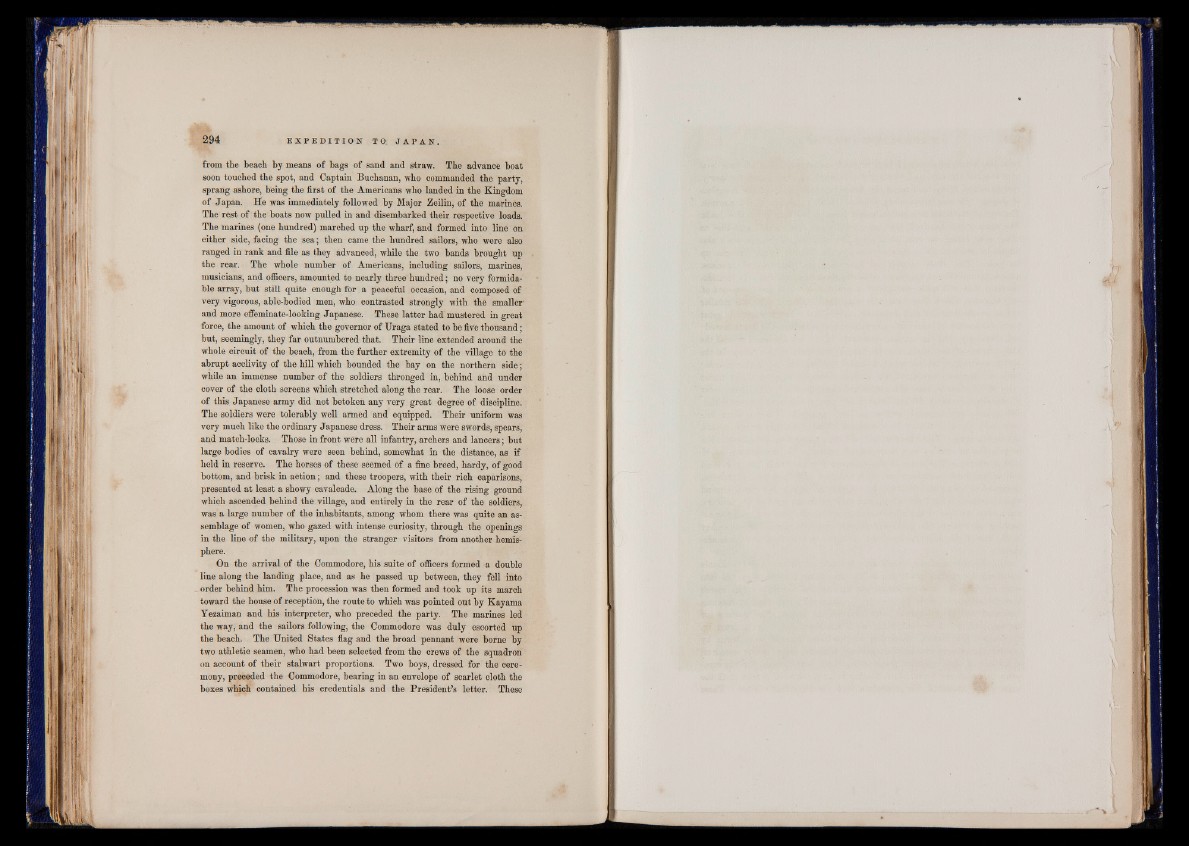
from the beaeh by means of bags of sand and straw. The advance boat
soon touched the spot, and Captain Buchanan, who commanded the party,
sprang ashore, being the first of the Americans who landed in the Kingdom
of Japan. He was immediately followed by Major Zeilin, of the marines.
The rest of the boats now pulled in and disembarked their respective loads.
The marines (one hundred) marched up the wharf, and formed into line on
either side, facing the sea; then came the hundred sailors, who were also
ranged in rank and file as they advanced, while the two bands brought up
the rear. The whole number of Americans, including sailors, marines,
musicians, and officers, amounted to nearly three hundred; no very formidable
array, but still quite enough for a peaceful occasion, and composed of
very vigorous, able-bodied men, who contrasted strongly with the smaller
and more effeminate-looking Japanese. These latter had mustered in great
force, the amount of which the governor of Uraga stated to be five thousand;
but, seemingly, they far outnumbered that. Their line extended around the
whole circuit of the beaeh, from the further extremity of the village to the
abrupt acclivity of the hill which bounded the bay on the northern side;
while an immense number of the soldiers thronged in, behind and under
cover of the cloth screens which stretched along the rear. The loose order
of this Japanese army did not betoken any very great degree of discipline.
The soldiers were tolerably well armed and equipped. Their uniform was
very much like the ordinary Japanese dress. Their arms were swords, spears,
and match-locks. Those in front were all infantry, archers and lancers; but
large bodies of cavalry were seen behind, somewhat in the distance, as if
held in reserve. The horses of these seemed of a fine breed, hardy, of good
bottom, and brisk in action; and these troopers, with their rich caparisons,
presented at least a showy cavalcade. Along the base of the rising ground
which ascended behind the village, and entirely in the rear of the soldiers,
was a large number of the inhabitants, among whom there was quite an assemblage
of women, who gazed with intense curiosity, through the openings
in the line of the military, upon the stranger visitors from another hemisphere.
On the arrival of the Commodore, his suite of officers formed a double
line along the landing place, and as he passed up between, they fell into
order behind him. The procession was then formed and took up its maroh
toward the house of reception, the route to which was pointed out by Kayama
Yezaiman and his interpreter, who preceded the party. The marines led
the way, and the sailors following, the Commodore was duly escorted up
the beach. The United States flag and the broad pennant were borne by
two athletic seamen, who had been selected from the crews of the squadron
on account of their stalwart proportions. Two boys, dressed for the ceremony,
preceded the Commodore, bearing in an envelope of scarlet cloth the
boxes which contained his credentials and the President’s letter. These
i f l
f
I